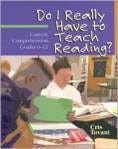Preparing myself to read something challenging

In an earlier post (A broken sleep) I wrote about preparing to teach a postgraduate course called 'Literacy across the secondary curriculum'.
With guidance from some wise souls who read the blog post, I came up with an assessment item which is designed to give my postgrad students an opportunity to test their own and others' assumptions and experience about how to promote adolescent reading against the experiences of an actual student. I described this in my subsequent blog past Headlights in the fog.
So where to now?
I don't start teaching the unit for a couple of months. In the meantime, I'm wanting to think much more deeply about how we teachers (in all subjects) can most effectively create better adolescent readers.
The professor who originally designed this 'literacy across the secondary curriculum' unit has given me some books she thought I might find useful. They are
Best Practices in Adolescent Literacy Instruction edited by Kathleen Hinchman & Heather Sheridan-Thomas
Informed Choices for Struggling Adolescent Readers by Donald Deshler and others
Reading Success for Struggling Adolescent Learners edited by Susan Lenski & Jill Lewis
These three books - soon to be joined by Cris Tovani's Do I really have to teach reading? - are sitting on my desk, as yet unopened. I'm reluctant to dip into them just yet.
Why?
I remember being deeply impressed, some years ago, by the idea (I can't remember where I heard it) that reading a new book is an act of courage. When we pick up a new book, we are making a decision to enter into the world-view of someone else, and in order to do this we need to - at least temporarily - set aside our own world view. We need to let go what we 'know', and what feels like solid ground. This can be an uncomfortable and disorienting experience. Of course we sometimes discover our own world-view reflected or supported. But there's a risk involved.
This is something I have always felt, at least with most theoretical non-fiction. When I want to learn from the way another experiences and sees the world, I need to temporarily turn away from the bearings that currently guide my vision and my action.
And I'm not yet ready to do that.
[And suddenly the face of a particular struggling reader comes to mind, a young boy I know well. This boy has had significant times in his school life when he has lost his way, and he is now only gradually recovering a more solid sense of himself in the world. If reading and learning feels to him like taking a risk, like a call to set aside a hard-won sense of self in the world, then perhaps that's a factor in his ongoing reading reluctance?]
Instead, before I read these books, I want to have a go at bringing my own perspective and assumptions to the surface, to articulate them, to make them more concrete and visible, to test them out a bit to see how durable they might be. Only when I've done that will I be ready to let go of them while I read some of these books.
So, over the coming weeks, I'm going to 'test drive' the draft assessment described in Headlights in the fog.
I'm going to pick a reluctant reader, a boy I've had in one of my classes, and I'm going to explore the nature of his particular challenges and strengths. I'll try to find out what has worked and what hasn’t worked to help this boy in the past. I'll speculate on whether there’s a significant disjunction between what he values and/or knows and what his teachers (including me) have assumed he should value and/or know. I'll ask whether the student's reading reluctance is linked to identifiable but currently unused strategies.
Then I'll read some of the books sitting on my desk.
I've got a student in mind, but I haven't asked him yet. I'm going to do that this afternoon. (Note: The boy was Josh, and I describe him in posts beginning here.)



